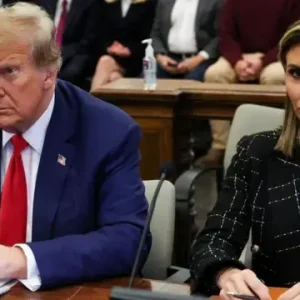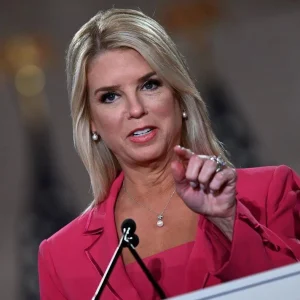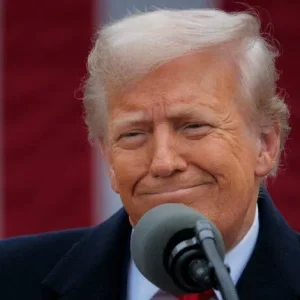Why It Matters
Trump emphasized his economic plan on the campaign trail, pledging to bring down inflation faced by Americans after the COVID-19 pandemic struck in 2020. However, economists warn that his plans, including tariffs, could lead to higher prices for U.S. consumers, and his efforts at implementing the policy caused stocks to drop.
The economy remains a top issue for most voters, and Trump’s handling of it will be on Americans’ minds heading into the 2026 midterms, as well as a handful of off-year gubernatorial races later this year. Democrats are hoping that growing dissatisfaction with his economic plans can carry them to victory in key races.

What To Know
A new CBS News/YouGov poll showed that Americans are increasingly critical of Trump’s handling of the economy, and that more people are blaming him than a month earlier. It surveyed 2,410 U.S. adults from April 8 to 11.
When asked whose policies are more responsible for the state of the economy, 54 percent said they believe Trump’s policies are more to blame. Only 21 percent said they believe Biden’s policies are to blame. Twenty percent said both of their policies are equally to blame, while 5 percent said neither are to blame for the state of the economy.
This compares to a March CBS News poll, when 38 percent of respondents said they blamed Biden for inflation, while only 34 percent blamed Trump.
A poll from YouGov and The Economist also showed that more Americans are blaming Trump for the economy.
Their latest poll, conducted among 1,741 adults from April 5 to 8, showed that 50 percent of Americans blame Trump for the economy, compared to 32 percent who blame Biden. Six percent said neither, while 13 percent were unsure.
That marks a slight shift from two surveys from the pollster in March. A March 16-18 Economist poll, among 1,618 adults, showed 48 percent blamed Trump, while 32 percent blamed Biden. A March 9-11 poll of 1,699 adults showed that 44 percent blamed Trump, while 34 percent blamed Biden.
On April 2, Trump rolled out tariffs on dozens of countries across the globe during his “Liberation Day” celebration, but the following week he put a 90-day pause on most tariffs, with the exception of China, a major global manufacturing hub.
The trade war has seen 145 percent tariffs imposed on Chinese imports, threatening to increase the prices of the cheap goods brought into the U.S. from manufacturers based there. There are, however, some items that will be exempt from the tariffs.
Stock markets initially plunged following the tariff announcement, with the Dow Jones Industry Average falling 9 percent from April 2 to 4. It has rebounded a bit since then but still remains 4 percent lower than before the tariffs were announced.
Others, however, believe the tariffs will benefit Americans. Kara Deniz, assistant director of communications for the Teamsters, a key labor union, previously told Newsweek that the tariffs will bring back good, union manufacturing jobs.
What People Are Saying
Meena Bose, executive dean of Hofstra University’s Peter S. Kalikow School of Government, Public Policy and International Affairs, told Newsweek: “The public typically holds presidents responsible for the state of the economy once they take office. Presidents who are critical of previous administration policies usually take quick action for which they, not their predecessors, are accountable to voters.
“President Trump’s policy shifts on tariffs raise many questions for voters about short-term and long-term consequences. Voter confidence in the economy will depend on how the administration addresses those concerns.”
CNN data analyst Harry Enten: “Of course, Joe Biden was the last president. Donald Trump is the current president. Donald Trump wants to say, ‘Don’t blame me if you’re upset with the state of the economy, blame the other guy.’ I don’t think Americans are buying what he’s selling, at least at this particular point anymore.”
What Happens Next
The new tariffs’ impact may be felt over the coming weeks and months. It’s yet to be seen how much of a toll the full impact may take on Trump’s approval rating.






